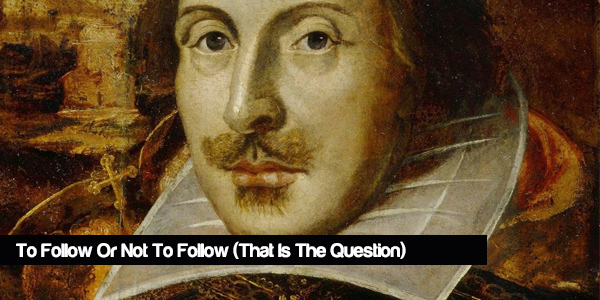
While scanning through twitter yesterday I was drawn to a new post on Enstine Muki’s blog titled ‘Backlinks can ruin your SEO‘. In a nutshell the post is about being careful: –
- Who you get links from
- Where you link to
Sounds sensible right? Well, unfortunately there is a problem with the message here and this passage in particular was something I felt I had to respond to: –
The danger is not only with dofollow links pointing to your blog. As a matter of fact, one of the things Google will kick you for is when you dofollow your external links. Well, that doesn’t mean a few dofollow external links will attract penalties but if Google thinks that you are selling those links, be ready for a hard knock on your cranium.
It’s recommended to strictly regulate the links you give out. Don’t just dish out dofollow as this is like preparing a hot seat for your “behind”.
So what’s the problem?
Well, let’s dig into the nofollow attribute a bit and find out why (in my opinion) advice like this is a misunderstanding of the purpose of the attribute and a potential problem for the citational link based model of ranking web pages.
The Beginnings Of Nofollow
Back in the mid 2000s, commenting on blogs was seen as an easy way to build up links to your site (thereby increasing it’s search rankings) and the practice was being abused on an industrial scale.
To maintain the quality of search results something had to be done and in early 2005 google’s Matt Cutts and Blogger’s Jason Shellen proposed the introduction of a new attribute (rel=nofollow) which could be used by search engines as an instruction: –
- Not to follow (spider) the link
- Not pass pagerank to the linked to site
Use of the new attribute was widely adopted by most popular blogging software and google and the other major search engines updated their algorithms accordingly.
Wider Implementation
As part of google’s continued battle against manipulative linkbuilding, they decided to expand the use of nofollow and decreed that paid links (including links in sponsored posts and adverts) should have the attribute applied.
The penalty for not adhering to this (if you were caught) would be a manual penalty and a reduction in the seller’s pagerank.
The attribute could also be used as a general “I’m not vouching for this site” flag and applied to any link at the discretion of the webmaster.
When Should The Nofollow Attribute Be Applied
Any user generated content should (generally) have the nofollow attribute addedto external links. Examples would be: –
- Forum posts
- Profile pages
- Social networks
- Wiki pages (all wikipedia links are rel=nofollow)
- Links in comments
As this content is not under the direct editorial control of the webmaster it is correct to apply the attribute to any external links as they cannot be vouched for.
Don’t You Trust Yourself?
We now come round to my problem with Enstine’s post and the way many people are now looking at links.
Enstine is correct to state that nofollow should be applied to paid links – that is one of the attributes primary purposes.
Beyond that though, if you are linking out from within content which is under your direct editorial control, then you should not be adding nofollow to those links. Basically that’s like saying to google ‘I don’t trust myself!’.
Assuming you are linking out to quality content and the links are contextually relevant (if they are not you have bigger problems) those links should absolutely be followed and should absolutely be passing pagerank.
The citational link based model of ranking web pages is still a good one, but it will cease to be as effective if we all start nofollowing everything. That’s not what the attribute is for.
I’ve seen a lot of confusion about this and a fear of linking out spreading over the last couple of years due to horror stories of penalties and google slaps. Believe me these penalties do not come from a couple of followed external links.
Far from being a thing to avoid, in my opinion (and experience) linking out freely to quality, related sites in your niche will help your rankings.
So link (and follow) away!
The Guest Post Conundrum
One area which is a little grey is guest posting.
MyBlogGuest’s recent hammering has resulted in many worried webmasters adding the nofollow attribute to external links contained in guest posts.
For me the issue here is again one of editorial control.
If you are just publishing guest posts willy nilly then you should either stop doing that (ideally) or yes, add nofollow to the links.
If however you publish the occasional guest post and have strong editorial and quality guidelines then I don’t think it’s something you need to worry about.
Google’s problem is with low quality guest posting as a scaleable link building tactic, not the practice of guest posting itself.
You can read my guidelines for guest blogging in 2014 for more on this.
There’s No Such Thing As Rel=Dofollow
One final point…
Links are followed by default and there is no such thing as a rel=dofollow so you don’t need to add that anywhere . You would be as well adding a rel=goldfish attribute.
That’s not a secret SEO ninja tip btw…
… or is it 😉

Over To You
What do you think of Enstine’s post? Do you agree with my opinion on the misuse of the attribute, or do you think it’s safer just to nofollow everything? Let me know by dropping a comment below!
[bigsignup]